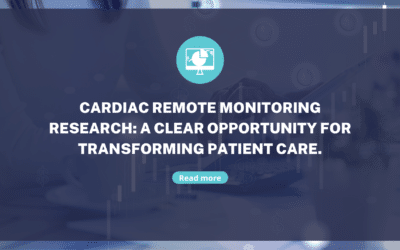Cardiac health issues typically require frequent monitoring, regular interventions, and quick decision-making when symptoms arise, which can place significant burdens on patients. Accessing the most appropriate care for the situation can be a major challenge for these individuals, especially those facing transportation issues, family and work obligations, or other financial stressors that influence their care choices.
Fortunately, new technologies are making it much easier for cardiac patients and their providers to make timely, informed decisions and when, how, and where to seek care.
Cardiac remote monitoring (CRM) tools, including connected implantable devices, external monitors, and smartphone apps, can empower patients and caregivers to monitor ongoing health, identify emerging risks, and address issues before they turn into bigger problems.
With nearly half of all U.S. adults at risk of developing some form of heart disease and an estimated 6-12 million people worldwide suffering with atrial fibrillation (a common heart arrhythmia that can lead to blood clots in the heart and increase the risk of stroke and heart failure), there is a clear and pressing need to deploy robust, patient-friendly CRM tools on a much broader scale.
To do so, the healthcare community must continue to engage in innovative research and develop a better understanding of how these technologies impact patient self-care, utilization of resources, and long-term health outcomes.
Harnessing the growing interest in Cardiac Remote Monitoring
Even before the COVID-19 pandemic, remote patient monitoring (RPM) was a hot topic for healthcare providers searching for more efficient, less intrusive ways to stay connected with patients. Using a combination of internet-enabled devices, smartphone apps, and audio or video chats, providers were already staying connected with more than 29 million patients at the start of the pandemic.
The public health crisis has only intensified interest in tech-enabled care at home. In addition to successfully using RPM strategies to avoid hospitalizations from the virus, providers and patients are both eager to use remote care for chronic disease management without the need to meet face-to-face.
As of April 2021, close to a quarter of practices surveyed by the Medical Group Management Association (MGMA) stated that they were already offering RPM to their patients. This tracks with predictions that the remote care market will be worth a staggering $1.7 billion by 2027, representing a 128 percent increase from current levels.
Building the case for wider use of remote monitoring technologies
Cardiac remote monitoring is likely to represent a major segment of that dynamic marketplace. With such strong interest and so many individuals potentially eligible for cardiac monitoring, it’s no wonder that researchers have been actively exploring the impact of CRM on patient experiences, healthcare spending, and clinical outcomes.
Many recent studies agree that CRM is a safe and viable alternative to traditional care strategies, highlighting the potential for CRM to actively reduce costs, avoid hospitalizations, and engage patients in their own care.
For example, the landmark ECOST study found that remote monitoring of individuals with implantable cardioverter defibrillators (ICDs) resulted in fewer major adverse events than the standard of care. Remote monitoring also helped reduce the number of shocks delivered, including a 52 percent reduction in inappropriate shocks. Not only did patients have a better experience with remote monitoring, but the batteries in their devices lasted longer due to less usage. Moreover, the study proved that remote monitoring decreased costs for payers.
A separate study also found improved patient adherence to care with CRM. Individuals participating in remote monitoring were notably more likely to stay adherent to regular checks and scheduled follow-ups compared to people undergoing conventional care.
Lastly, CRM can help to control health system spending by reducing avoidable utilization. In a recent European multi-center trial, researchers found a 79 percent reduction in planned in office evaluations – and no increase in unplanned clinic visits – among patients who only used home monitoring to manage their conditions. Providers also saved time with these patients. CRM slashed the length of follow-up visits in half for remote-only patients.
These and other ongoing studies show that CRM is a promising way to safely and effectively improve patient experiences, but aslo avoid unnecessary costs without negatively impacting clinical outcomes.
Translating knowledge into action with an innovative CRM platform
As a clinician-founded and outcomes-driven member of the CRM community, Implicity is excited to see the evidence building in favor of remote care for cardiac patients. We strongly believe that data-driven remote care is transformative for patients and their clinicians, offering the chance to get ahead of developing concerns and promoting the delivery of preventive actions.
Because we are so passionate about showcasing the power of remote care for cardiac conditions, we want to do our part to support innovation and evidence-based medicine. That’s why we are launching our first Cardiac Remote Monitoring Contest to accelerate research into this critical topic.
We are offering our platform to researchers who need to collect, analyze, and report on the raw data gathered from cardiac implants. Our tools can help examine outcome data, investigate processes, analyze economic impacts, gather insight on patient experiences, and more.
As interest in remote cardiac monitoring continues to increase, this is a pivotal moment for technology developers, researchers, and clinicians. We must work together to generate successful, high-quality research that can inform proactive, effective decision-making for clinicians, healthcare executives, and patients.
To meet our independent panel of judges and to apply for the contest, please click here.
Arnaud Rosier, CEO of IMPLICITY®.

